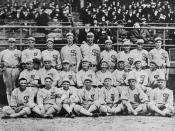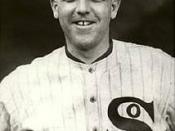The 1919 World Series resulted in the most famous scandal of baseball history. Eight players from the Chicago White Sox were accused of throwing the series against the Cincinnati Reds. The events concerning the series were very controversial and many of the facts died with the participating team players. However, the players were banned from playing professional baseball for life without being convicted for any crimes. The purpose of this paper is to examine whether the eight players are actually innocent or guilty of being involved with the scandal. It will also seek to prove the unfairness of the Commissioner of Baseball, Charles Comiskey, unprecedented decision to deprive eight players of their sport despite their being acquitted of criminal charges and examine the facts concerning Joe Jackson's part in the scandal.
The first and most important point of whether the players were actually innocent or guilty is easy to prove.
On September 28, 1920, one day after the world series fix had been exposed, Eddie Cicotte admitted his involvement to Charles Comiskey's attorney, Alfred Austrian. Cicotte was quickly taken to the Crimal Courts building where Comiskey's attorney introduced him to Assistant State's Attorney Hatley Replogle. By 11:30 a.m., Cicotte was being questioned in fron of the Grand Jury. Within hours of Cicotte's confessions, Joe Jackson would also go to Austrian and Replogle to admit his involvement. Pitcher, Lefty Williams, would be the third player to come forward that day. Like Cicotte and Jackson, Williams would sign a waiver of immunity and a confession. By the end of the day, the eight Black Sox players were all indicted (1919BlackSox. Com). The players were willing to throw the series because they would have received a total of $100,000 to split among themselves. Although this may not seem like a lot of money...


![English: Photo courtesy of the Boston Public Library. Charles Comiskey, owner of the Chicago White Sox. Photo caption: The Old Roman, Comisky [sic], owner of the Chicago Americans.; McGreevey no. 5](https://s.writework.com/uploads/1/12343/english-photo-courtesy-boston-public-library-charles-comiske-thumb.jpg)
^__^
Over all it was a pretty good essay though I'd wished you'd written more about how the lifes of the eight baseball players changed money wise, and stuff.
1 out of 1 people found this comment useful.